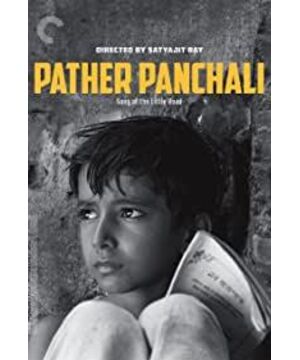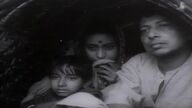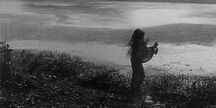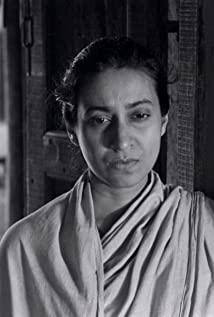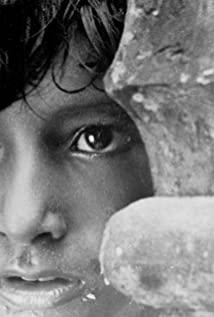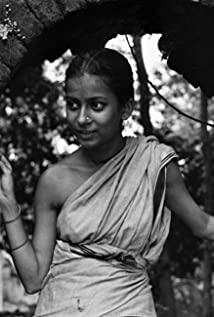-"Arp Trilogy" film
review smallbean
"The heart does not die, when we think it should die."
-Cheslaw Milosz "A Lament for NN"
"The great, sad and gentle touch of "Arp Trilogy" stays in the minds of movie fans, like a promise about the possibility of film. It transcends the trend of fashion and creates a convincing The world turned out to be another life in which we might live... It is like a prayer that definitely tells us that this is the realm that the film can reach, no matter how deep we are lost in our own cynicism." [ 1]
This is Roger Ebert's comment on the "Arp Trilogy" in the book "The Great Movies", and it is also the direct motivation that drove me to watch these Rey's films. Realistic (if not outdated) subject matter, simple photographic style (on the one hand limited by technical conditions), ordinary human emotions and memories, all these will not detract from it to bring more to someone who has just watched "Interstellar" The deep tree shook the house's inner storm. Yes, it is like a continuous prayer, with a heartbreaking elegy tone, summoning the tenderness of the lost old friend and perhaps our dying, the latter in the cynical disdain of modernity and the arrogance that accompanies the symbiosis of reason. Difficulty ups and downs, dying breath.
"At that time there were people who loved and hated, so there were also angry people and despised people..."
——Chekhov "Script Without Title" [2]
In the process of watching the ending of "Song of the Earth" and "Song of the Big River", I was repeatedly angered, angry at the cruel texture of the story, and finally, I was trapped in a desolate halo out of anger that is difficult to shape. It’s been a long time to come back, and I almost want to put the inhumane guilt of this "drama" on the screenwriter (that is, the director and the author of the original novel)-this kind of angry transfer is just like "Song of the Big Tree". The terrible news Apu punched the messenger in the face. At this moment, the truth seems to be rather untrue, but now I wish the non-existence, the reality is calling for surreal luck.
However, "unfortunately" this is still a traditional film whose reality is beyond imagination. To use the words of the Austrian writer Robert Muzier who wrote "If there is a sense of reality, then there must be a sense of virtuality." That is, "This is just a world that has not been cleared... Hell, people have few other words to describe it: it is simply surprisingly realistic." [3] Different from Dostoyevsky The psychological realism that I think is the highest realism. This film hardly depicts the psychology of the characters, because Apu’s mother is innocent and ignorant just like Camus’s mother in "The First Man". All the patience, waiting, giving, hope and despair are dumb and there are no words to express. "The relationship between Apu and his mother reflects the fact that exists in all cultures: Parents pay year after year, but only see their children leave home, unconsciously going elsewhere to start their adult life." [4] The experiences of Apu and Camus are the same. After the loss of their father, they were led by a spiritual father to the other side of the ego brought about by education. As the "first person" to escape from the gloom and dumbness, he also "Escape from the real dark night of your (mother)" [5]. The reality of this movie is reflected in its moral ambiguity, because only by insisting on moral ambiguity can the complexity of reality be touched. Just like Apu’s sister in "Song of the Earth" is a habitual thief (stealing fruits and necklaces from neighbors), Apu’s mother is not the perfect Virgin. She swept her very old aunt out several times, even ignoring her wish. The last wish to die in the ancestral house. These are less acceptable but normal phenomena in the poor world, and the director does not evade them. Just as disease and death patronize the world more commonly, this is the so-called "poor people's culture", "that is, the cultural rules chosen by the poor to become more common and quicker murderers when they suddenly become cancer patients" [ 6].
The American sociologist Mills said in "The Imagination of Sociology" that the Sociology Society gives people more of the ability to observe their own lives from the perspective of others, and at the same time use this as a starting point to better understand the lives of others, and achieve people Communication and understanding between people. In my opinion, about empathy, novels and movies are better done. Zbigniew Herbert said, "Writing is not a medium of expression, not a medium of expressing oneself, but an art of empathy—that is, entering into others" [7] . The same goes for film writing. He also said, "I like to read philosophy-everything is clarified in it, everything comes from concepts. But it doesn't convince me. People need both a mind and a heart." [8] This and Arendt Her point of view hit it off. She once asserted: “Any philosophy, any analysis, any aphorisms, no matter how profound they are, cannot be compared in breadth and depth to a well-told story.” Only a well-told story can make a difference. We are tempted, "Without it, we would never be able to obtain the gift of a wise heart. We may be able to understand the law of life, but we cannot comprehend the way of life." [9]
"Arp Trilogy" is such a carefully told story. The vision of shooting things inherited from Italian neorealism finally gives us a new perspective of observation. There are stagnant reality here, as well as agile childhood and light dreams. "Although there is pain here, peace can always come. There is also despair here, but the arrival of comfort is also unstoppable." [10] It is as clear and moving as "Mirror" and "My Childhood", showing the state of existence that "they live or struggle with their persistence and patience", and give them "the world's only valuable self-esteem, that is, the poor." Self-esteem" [11].
It is this kind of story that makes the hearts of us "voyeurs" in the dark look like balloons with some outlines. In the words of "The New Yorker" film critic David Danby:
"It is precisely because we are cowardly watching and not participating that make art possible, and it also makes possible a new kind of moral response to art. We do not directly intervene, but identify with one character after another. We are caught by various dramas. Manipulated by power, we are forced to understand all kinds of things that happen. It is not easy to be a peeper. After all, narration itself is a ritual, a secular ritual: the way the story'comes out' ——The performance of a specific action, whether it is realistic or symbolic——It embodies a certain truth or fallacy of social life and personal life... To a certain extent, viewing is irresponsible and morally unstable, but in the end It’s not like that. We have to inspect and measure. If a work truly expresses the complexity of life to a certain extent, then the analysis and understanding is a hard work, and we must go through uncertainty, repetition, and torture. . We have become critics, not just me, but everyone." [12]
Notes:
[1] [4] (United States) Roger Ebert, "The Great Movie", Guangxi Normal University Press, 2012 Years, 69 pages, 73 pages.
[2] The eleventh volume of "The Collected Works of Chekhov", Shanghai Translation Publishing House, 1997, 13 pages.
[3] (Austria) Robert Muzier, "People without Personality", Writers Publishing House, 2000, 94 pages.
[5] [11] (French) Albert Camus "The Collected Works of Camus", Yilin Publishing House, 1999.
[6] (English) Sigmund Bowman, "This Is Not a Diary", Lijiang Publishing House, 2013, 54 pages.
[7] [8] (Poland) Adam Zagayevski edited "The Essays of Polish Writers", "Interview with Zbigniew Herbert: The Art of Empathy".
[9] (French) Alan Finkirklau, "A Wisdom Heart", Yilin Publishing House, 2014, foreword 1-2 pages.
[10] (United States) Susan Sontag, "The Key Point", Shanghai Translation Publishing House, 2004, 79 pages.
[12] (United States) David Danby, "The Great Book", Jiangsu People's Publishing House, 1999, 162 pages.
View more about Pather Panchali reviews


